人教版英语选修6-unit1词汇教学课-
- 格式:ppt
- 大小:4.44 MB
- 文档页数:46
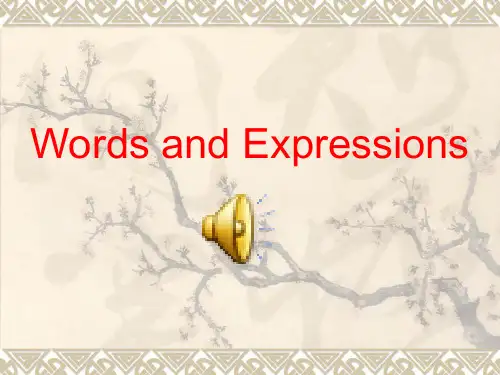
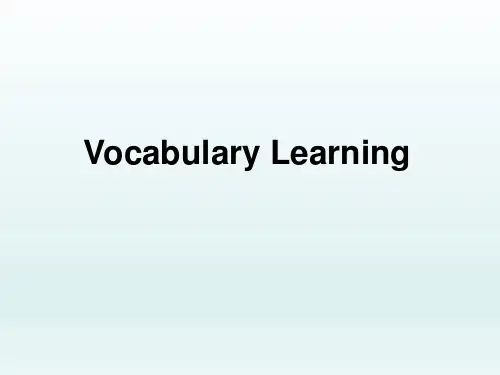
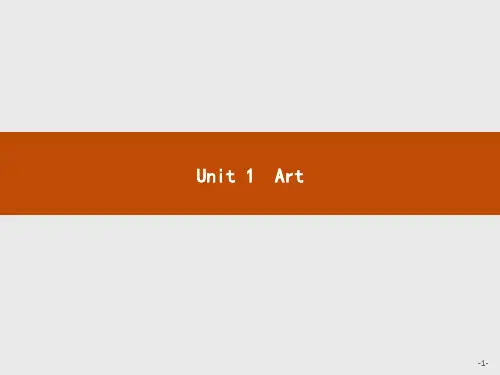
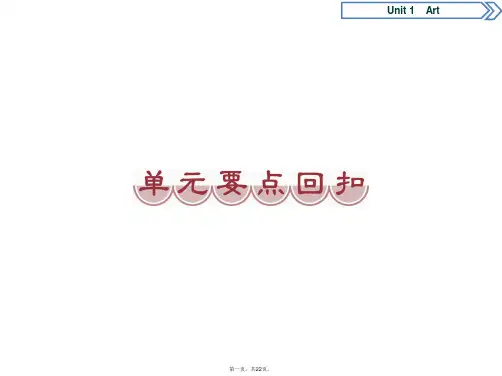
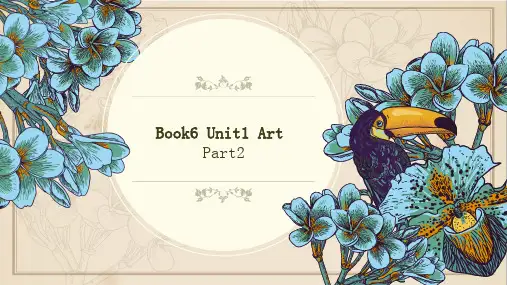
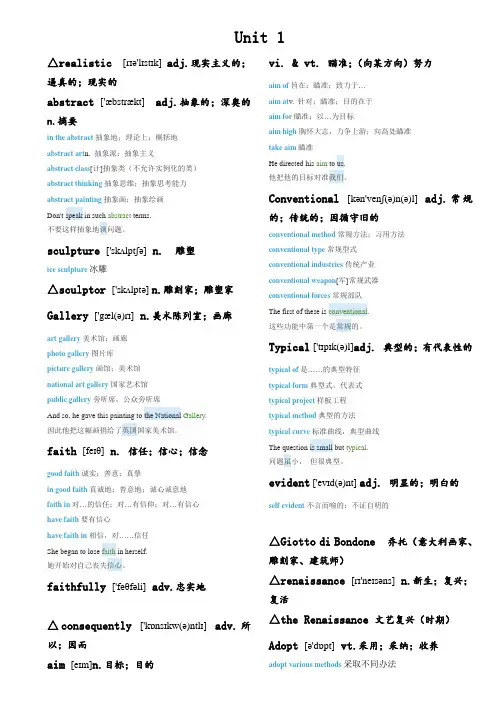
Unit 1△realistic [rɪə'lɪstɪk] adj.现实主义的;逼真的;现实的abstract ['æbstrækt] adj.抽象的;深奥的n.摘要in the abstract抽象地;理论上;概括地abstract art n. 抽象派;抽象主义abstract class[计]抽象类(不允许实例化的类)abstract thinking抽象思维;抽象思考能力abstract painting抽象画;抽象绘画Don't speak in such abstract terms.不要这样抽象地谈问题。
sculpture ['skʌlptʃə] n. 雕塑ice sculpture冰雕△sculptor ['skʌlptə] n.雕刻家;雕塑家Gallery ['gæl(ə)rɪ] n.美术陈列室;画廊art gallery美术馆;画廊photo gallery图片库picture gallery画馆;美术馆national art gallery国家艺术馆public gallery旁听席,公众旁听席And so, he gave this painting to the National Gallery.因此他把这幅画捐给了英国国家美术馆。
faith [feɪθ] n. 信任;信心;信念good faith诚实;善意;真挚in good faith真诚地;善意地;诚心诚意地faith in对…的信任;对…有信仰;对…有信心have faith要有信心have faith in相信,对……信任She began to lose faith in herself.她开始对自己丧失信心。
faithfully ['feθfəli] adv.忠实地△consequently ['kɒnsɪkw(ə)ntlɪ]adv.所以;因而aim [eɪm]n.目标;目的vi. & vt. 瞄准;(向某方向)努力aim of旨在;瞄准;致力于…aim at v. 针对;瞄准;目的在于aim for瞄准;以…为目标aim high胸怀大志,力争上游;向高处瞄准take aim瞄准He directed his aim to us.他把他的目标对准我们。
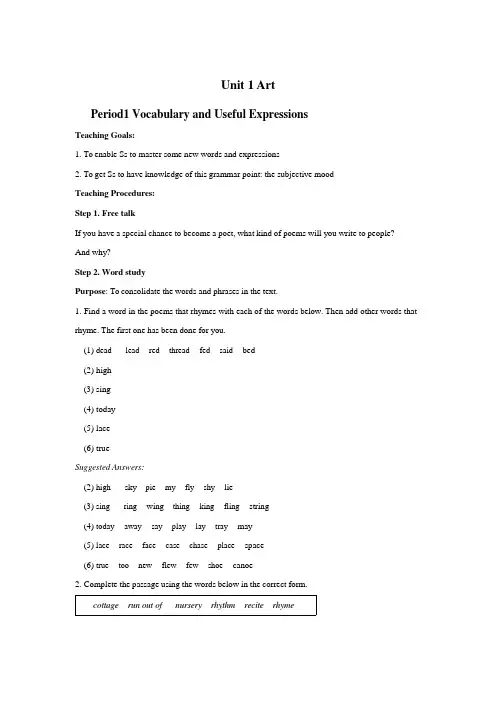
Unit 1 ArtPeriod1 Vocabulary and Useful ExpressionsTeaching Goals:1.To enable Ss to master some new words and expressions2.To get Ss to have knowledge of this grammar point: the subjective moodTeaching Procedures:Step 1. Free talkIf you have a special chance to become a poet, what kind of poems will you write to people?And why?Step 2. Word studyPurpose: To consolidate the words and phrases in the text.1.Find a word in the poems that rhymes with each of the words below. Then add other words that rhyme. The first one has been done for you.(1)dead lead red thread fed said bed(2)high(3)sing(4)today(5)lace(6)trueSuggested Answers:(2)high sky pie my fly shy lie(3)sing ring wing thing king fling string(4)today away say play lay tray may(5)lace race face case chase place space(6)true too new flew few shoe canoeplete the passage using the words below in the correct form.c o t t a g e r u n o u t o f n u r s e r y r h y t h m r e c i t e r h y m eWhen I was a baby, my mother used to read me rhymes, I loved their and the way the words at the end of the lines. By the time I was two years old, I could at least ten of them. When we new nursery rhymes, my mother would go to the store to buy another nursery rhyme book. In fact, my family loved reading so much that the living room in our was full of books.Suggested Answers:nursery; rhythm; rhyme; recite; run out of; cottage.3.In English we sometimes add –ful to a noun to make an adjective. For example, wonder becomes wonderful. This means full of wonder. Now make adjectives form these nouns. Then add four other pairs you know.(1)beauty (5) dread (9)(2)joy (6) hope (10)(3)sorrow (7) peace (11)(4)delight (8) power (12).Suggested Answers:(1) beautiful (2) joyful (3) sorrowful (4) delightful (5) dreadful(6) hopeful (7) peaceful (8) powerful (9) thankful (10) successful (11) painful (12) usefulplete the table with the correct nouns, verbs, adjectives or adverbs.Verb AdverbNoun AdjectiveangrydarkenimpressiverepetitivetransformationaltranslationwarmenjoyexpressivelyinspireSuggested Answers:Verb AdverbNoun Adjectiveanger anger angry Angrilydark darken dark darklyimpression impress impressive impressively repetition repeat repetitive repetitively transformation transform transformational \translation translate translated \warmth warm warm wrmlyenjoyment enjoy enjoyable enjoyably expression express expressive expressively inspiration inspire inspirational inspirationallyplete each sentence using the correct word from the table you have just completed. (1)While you were reciting the poem, I think you moved your body very . It made the performance much more interesting.(2)Ad I lay in the , the words of a new poem came into my head.(3)The teacher doesn’t think that the of the Tang poem is very good.(4)Songs are often easy to remember because they a lot of poetry.(5)Your talk was so that I want to go and write lots of poetry.(6)I loved the strong images you used in your poem to convey feelings of .(7)We were very by the students’ performance of their poetry.(8)We passed the afternoon very reading poetry together under the trees.(9)Mr. Tanne r’s love of poetry has the students’ feelings towards the subject.(10)Even though it is cold, your poem about summer has made me feel really . Answers:(1) expressively (2) darkness (3) translation (4) repeat (5) inspirational (6) anger (7) impressed (8) enjoyably (9) transformed (10) warm Step 3. Grammar1.PresentationPurpose: To revise the usage of the subjunctive mood with Ss.所述情况从句主句与现在事实相反If+主语+动词过去式主语+ would/could/might/should+ (be 动词用were)动词原形与过去事实相反If+主语+动词过去完成式主语+ would/could/might/should+have + 过去分词与将来事实相反①if+主语+动词过去式主语+ would/could/might/should+②if+主语+were to + 动词原形动词原形③if+主语+should+动词原形此表中需要注意几点:(1) be 动词在表示与现在事实相反的从句中一般用were.在非正式情况先,第一、第三人称后偶尔也用was. 如:If he were you, he would go at once.(2) 主句中的should 通常用于第一人称,would,could 以及might 可以用于各种人称。
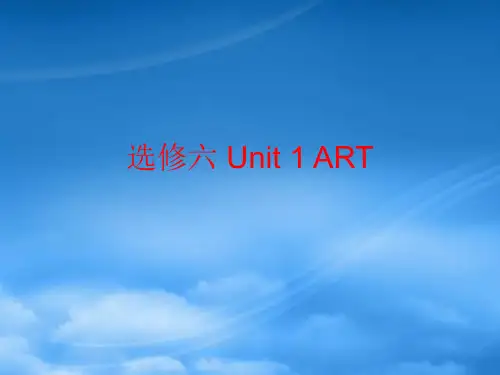
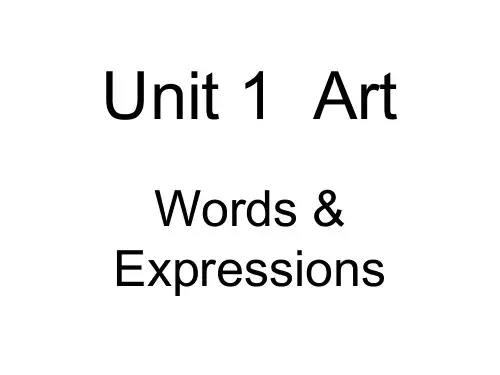
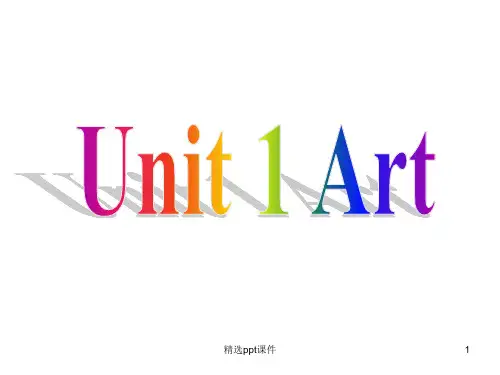
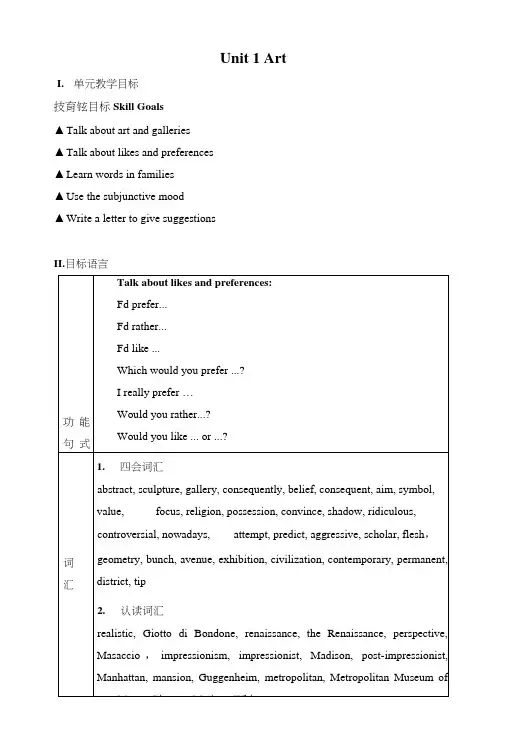
Unit 1 Art I.单元教学目标技育铉目标Skill Goals▲Talk about art and galleries▲Talk about likes and preferences▲Learn words in families▲Use the subjunctive mood▲Write a letter to give suggestionsII.目标语言m.教材分析与教材重组i.教材分析本单元以Art为主题,主要介绍了西方绘画简史,描写了曼哈顿最好的艺术长廊。
帮助学生了解更多有关美术的背景知识,分析中四方艺术史上各大流派的特点,指出其代表性的画家和作品,并对中西方绘画艺术进行比较。
最后要求学生为当地举办的一场别开生面的画展提岀合理化建议。
1.1Warming Up部分要求学生运用相关的目标语言对自己所喜欢的艺术形式和艺术流派展开讨论,并说明喜欢的原因。
1.2Pre-reading让学生讨论有关画展或书中的艺术作品以及西方不同历史时期的著名画家。
1.3Reading介绍了西方绘画简史上不同历史时期的艺术流派、艺术特点及其代表性的Iffll家和作品等。
1.4Comprehending要求学生在理解课文的基础上,写出三件有关西方艺术史的事并指出西方艺术风格变化大的原因。
1.5Learning about Language 由Discovering useful words and expressions 和Discovering useful structures两部分组成。
要求学生对课文进行概括和总结,找岀所提供单词的词根,并学习虚拟语气在条件状语从句中的运用。
1.6Using Language 是由Reading, Listening and speaking 和Writing 三部分组成,通过对学生听说读写综合能力的培养,要求学生在了解艺术长廊相关知识的慕础上,为当地举办的一场别开生面的画展提出合理化建议。